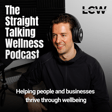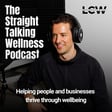
Episode 5 - Heart health
In honour of Heart Month and the British Heart Foundation this episode is dedicated to looking after your heart health through lifestyle changes.
Heart disease is still the leading cause of death worldwide—but how much do you actually know about your own heart health? In this episode, LCW founder Russ Harris and LCW consultant nutritionist Dan Price break down the risks, prevalence, and outcomes of heart disease, along with the key lifestyle strategies that can help keep your heart in top shape.
We cover:
🫀 The impact of diet, exercise, and stress on heart health
📊 How to track and monitor your heart health effectively
🎯 What optimal heart health ranges should look like
If you’re looking for practical, no-nonsense advice on protecting your heart, this episode is for you. Listen now! 🎧
For more high quality wellness advice and coaching head over to the LCW wellness app

